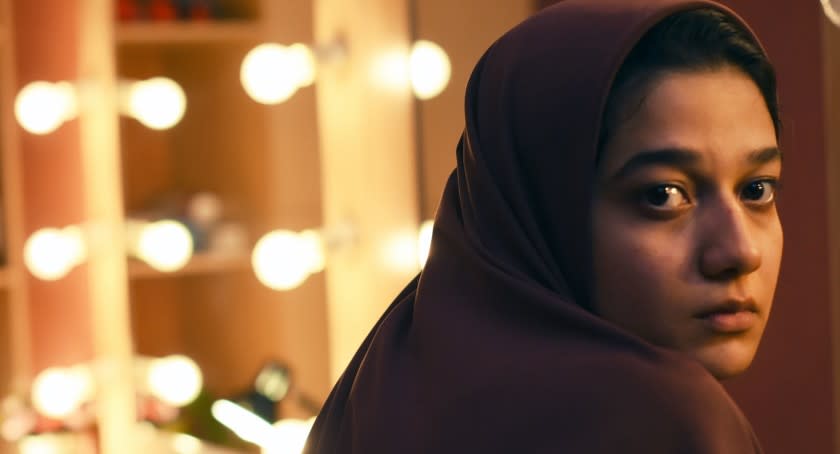Review: Reality TV, Iranian-style, in 'Yalda, a Night for Forgiveness'

Sentenced to death, a young woman seeks atonement on live television in writer-director Massoud Bakhshi’s “Yalda, a Night for Forgiveness.” The riveting and superbly acted Iranian drama, based on a real variety show, poses a moral crucible born out of a theocratic system that disfavors women amid the heightened tension of the on-camera spectacle.
On Yalda Night, a Persian winter solstice celebration, Maryam (Sadaf Asgari) leaves prison to attend the late evening program “Joy of Forgiveness” to ask the adult daughter of the man she accidentally killed — her own much older husband — to spare her life. With frenetic energy, cinematographer Julian Atanassov’s camera tracks the behind-the-scenes chaos as producer Mr. Ayat (Babak Karimi, known for Asghar Farhadi’s “The Salesman”) wrangles musical acts and famous guests before the surreal main event: preventing a hanging.
Bakhshi’s concise screenplay, which plays in real time without flashbacks, cleverly dispatches exposition via devices organic to the fictional production (a video recap of the case) and the moderated argument between Maryam and her potential savior or executioner Mona (Behnaz Jafari) in front of millions of viewers. As an extra touch of morbid absurdism, if enough people text in support of a pardon, and Mona in fact absolves, the show’s sponsors will pay the blood money.
Even before she utters a single word, Asgari’s eyes transmit Maryam’s furious anguish and desperation. Coerced to marry a man several decades her senior and relinquish her desire to be a mother, she is in disbelief of the situation facing her. But while Mona, as the prosecuting party, has the upper hand, her selfish motivations still emanate from the inferior position she holds under Iranian law in relation to men. Meanwhile, Maryam’s mother (Fereshteh Sadre Orafaiy) preemptively commits an unspeakable offense knowing the odds are against her daughter’s survival. This is a high-wire dramatic act.
Taking the concept of the “court of public opinion” to heart, “Yalda” — which could function as a companion piece to Mehrdad Oskouei’s documentaries “Starless Dreams” and “Sunless Shadows” about imprisoned Iranian women — points to the patriarchal social structure that has led them to this public and dehumanizing clash. For victims of institutionalized gender discrimination, even a positive resolution to this battle won’t grant them a sense of justice.
This story originally appeared in Los Angeles Times.

